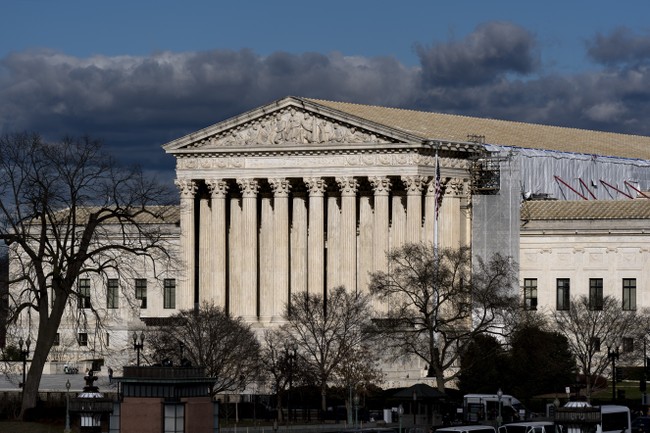The Tennessee attorney general led a coalition of state attorneys general in filing an amicus brief with the U.S. Supreme Court asking the justices to clarify whether the Fourteenth Amendment’s Citizenship Clause automatically grants American citizenship to every child born on U.S. soil. The brief argues lower courts have stretched the clause beyond its Reconstruction-era meaning, points to historical debates and early case law, and notes that the 1898 Wong Kim Ark decision involved parents who were lawfully domiciled in the United States. The filing runs 37 pages and lists more than two dozen states backing the position, while the states emphasize broader policy consequences connected to migration and enforcement. The brief and related filings are now before the Court as it considers whether to revisit the scope of birthright citizenship.
Tennessee Attorney General Files Amicus Brief in US Supreme Court Opposing Birthright Citizenship
Tennessee Attorney General Jonathan Skrmetti and attorneys general from 24 other states filed the amicus brief today, asking the Supreme Court to clarify that the Fourteenth Amendment’s Citizenship Clause does not automatically confer citizenship on every person born in the United States. The brief urges the Court to correct what the states view as misreadings by lower courts that have treated the clause as a blanket guarantee, regardless of parents’ residency or immigration status. The filing frames this as a legal question with major implications for state policy, federal immigration enforcement, and the allocation of public resources.
“The idea that citizenship is guaranteed to everyone born in the United States doesn’t square with the plain language of the Fourteenth Amendment or the way many government officials and legal analysts understood the law when it was adopted after the Civil War,” Attorney General Skrmetti said in a news release. “If you look at the law at the time, citizenship attached to kids whose parents were lawfully in the country. Each child born in this country is precious no matter their parents’ immigration status, but not every child is entitled to American citizenship. This case could allow the Supreme Court to resolve a constitutional question with far-reaching implications for the States and our nation.”
The states contend that a close look at 19th-century decisions, statutes, and legal commentary shows the Citizenship Clause was tied to parental domicile and allegiance, not to short-term or unlawful presence. Their brief traces a line of case law and legal thought from the 1860s through the early 1900s that, in their view, supports a narrower reading of automatic citizenship. The argument is built on historical practice from the Reconstruction Era, including debates in Congress and executive-branch actions that treated parental status as central to who became a citizen at birth.
Today Tennessee and @agiowa filed a SCOTUS brief challenging birthright citizenship on behalf of 24 states.
"Each child born in this country is precious no matter their parents' immigration status, but not every child is entitled to American citizenship." – Attorney General… pic.twitter.com/5efjURRFMt
— TN Attorney General (@AGTennessee) October 24, 2025
The 37-page brief lays out archival sources, contemporaneous legal commentary, and examples of official practice to buttress the historical claim. It notes that many later arguments rely heavily on the 1898 Supreme Court decision in United States v. Wong Kim Ark, which is often cited for a broad rule of birthright citizenship. The brief points out that Wong Kim Ark involved parents who were lawfully present and permanently domiciled in the United States, and it urges the Court to consider how that factual frame matters for the constitutional ruling.
The filing identifies Tennessee and Iowa as the lead states and lists the other states joining the brief: Alabama, Alaska, Arkansas, Georgia, Florida, Idaho, Indiana, Kansas, Kentucky, Louisiana, Mississippi, Missouri, Montana, Nebraska, North Dakota, Oklahoma, South Carolina, South Dakota, Texas, Utah, West Virginia, and Wyoming. The coalition argues these states have concrete interests in how citizenship rules affect public benefits, fiscal planning, and enforcement priorities. By pressing the historical record, they want the Court to provide a clear rule that states can apply without continual legal uncertainty.
Beyond constitutional history, the brief and related commentary tie into current enforcement data and policy debates. The Department of Homeland Security reported that more than 2 million illegal immigrants have either been removed or chosen to leave within the first 250 days of the current presidential administration, a figure the states say highlights the connection between immigration flows and questions about legal status at birth. The coalition frames the Court’s decision as pivotal to shaping long-term immigration policy rather than leaving fundamental questions to shifting lower-court rulings.
The brief also highlights recent criminal enforcement examples to underscore the stakes, noting prosecutions and convictions tied to fraud and theft in public assistance programs that involved noncitizens. Those examples form part of the states’ practical argument that clear, settled rules about who becomes a citizen at birth matter for integrity in public programs and for public confidence. The legal challenge now moves to the Supreme Court, where the justices will decide whether to take up the broader constitutional question raised by the states’ filing.






